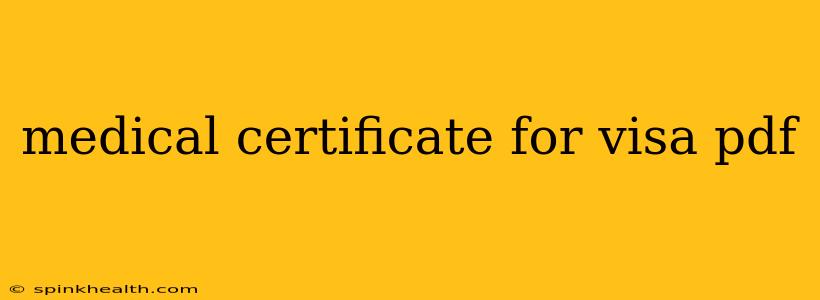Navigating the World of Medical Certificates for Visas: A Comprehensive Guide
Applying for a visa often feels like navigating a labyrinth of paperwork. One crucial document that can often trip up applicants is the medical certificate. This isn't just a simple form; it's a testament to your health, playing a vital role in the visa application process. This guide will unravel the mysteries surrounding medical certificates for visas, addressing common questions and concerns.
What is a Medical Certificate for a Visa?
Imagine this: you've meticulously filled out your visa application, gathered all the necessary documents, and are brimming with excitement for your upcoming trip. Then, you encounter the request for a medical certificate. What is it, and why is it needed?
A medical certificate for a visa is a formal document from a licensed medical professional confirming your good health and freedom from certain communicable diseases. It acts as assurance for the immigration authorities that you won't pose a public health risk. The specific requirements vary greatly depending on the country you're applying to, the type of visa, and even the length of your stay.
What are the requirements for a medical certificate for a visa?
This is where things get specific. There's no one-size-fits-all answer. The requirements are dictated by the embassy or consulate of the country you're applying to. Generally, you’ll need a certificate from an authorized doctor or clinic, which includes:
- Your personal details: Full name, date of birth, passport number.
- Results of medical examinations: This often includes blood tests, chest X-rays, and sometimes urine tests, screening for diseases like tuberculosis, HIV, and other infectious illnesses.
- Doctor’s statement: A declaration by the physician confirming your fitness to travel and absence of any health conditions that could pose a risk to public health.
- Official stamp and signature: The certificate must bear the official stamp and signature of the medical professional who conducted the examination.
- Date of examination: This is essential for validating the certificate’s relevance.
Where can I get a medical certificate for a visa?
This often depends on the specific requirements set by the embassy or consulate. Some countries may have a list of approved medical centers, while others may accept certificates from any licensed physician. It’s crucial to check the official website of the embassy or consulate of the country you're applying to for their explicit requirements. Don't assume; confirm! A simple oversight can lead to delays or even rejection of your application.
What if I have a pre-existing medical condition?
Having a pre-existing medical condition doesn't automatically disqualify you from obtaining a visa. However, you must disclose this information honestly and accurately on your application and medical forms. The immigration authorities will assess your condition to determine if it poses a risk or requires special accommodations. Be prepared to provide additional medical documentation to support your application.
How long is a medical certificate for a visa valid?
The validity period varies depending on the country's requirements. Some certificates might be valid for only a few months, while others may be valid for a year or longer. Always check the specific requirements on the relevant embassy or consulate website. Using an expired certificate is as good as not having one at all.
Can I get a medical certificate for a visa online?
While you might find some online resources offering assistance with the process, you cannot obtain a legitimate medical certificate completely online. The examination, including physical assessment and tests, must be conducted in person by a licensed medical professional. Beware of fraudulent websites claiming otherwise.
What happens if my medical certificate is rejected?
If your medical certificate is rejected, it usually means it didn't meet the specific requirements outlined by the embassy or consulate. This often requires getting a new certificate from an authorized medical center, ensuring strict adherence to all guidelines. It's frustrating, but a vital step towards a successful application.
This journey through the world of medical certificates for visas highlights the importance of thorough preparation and attention to detail. Always prioritize accurate information from official sources to ensure a smooth and successful visa application process. Remember, a little extra effort in this stage can save you significant time and potential setbacks down the line.

